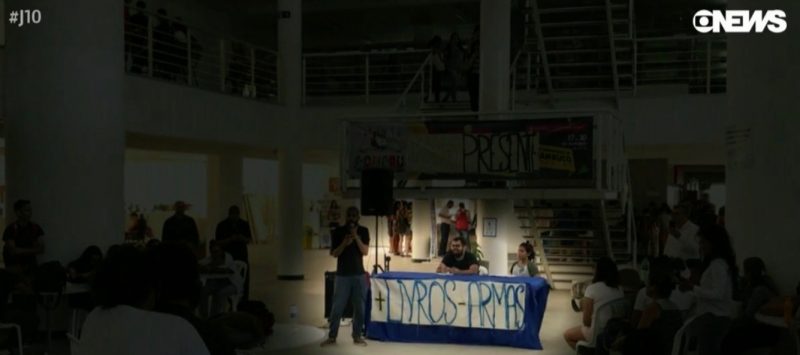
Police seized a banner that said “more books, fewer guns” in a university in Paraíba following a court ruling that deemed it “partisan propaganda”. Photo: Screenshot GloboNews
Police raids on university campuses targetting leftist demonstrations. An escalating campaign encouraging students to denounce professors who criticize the president-elect. Opponents of Jair Bolsonaro are bracing themselves for a ideological persecution and an overall crackdown on freedom of expression in public spaces in Latin America’s largest democracy.
On October 28, Brazil elected far-right Jair Bolsonaro as its next president. The former army captain and congressman publicly expresses homophobic, misogynist and racist views, advocates violence against his political opponents and threatens the press.
On October 26, around 30 universities in Brazil were subject to police raids following coordinated rulings by multiple regional electoral courts. Justice officials confiscated banners and flags and banned demonstrations in defence of democracy and against fascism as the courts ruled they constituted illegal political-partisan propaganda. Many public authorities and civil society figures called the raids a blatant act of censorship by Brazil's judiciary.
Jair Bolsonaro spoke in support of the raids soon thereafter on a live broadcast on his Facebook page:
A universidade não é lugar [de protesto], mas, se querem fazer um ato desse, os dois lados têm que ter o direito de fazer.
The university is not the place for [protests], but, if they want to hold this kind of event, both sides must have the right to do it.
On October 27, one day before Brazilians cast their ballots, Justice Court Cármen Lúcia suspended all rulings. In her decision, she stated:
Daí ali ser expressamente assegurado pela Constituição da República a liberdade de aprender e de ensinar e de divulgar livremente o pensamento, porque sem a manifestação garantida o pensamento é ideia engaiolada.
Também o pluralismo de ideias está na base da autonomia universitária como extensão do princípio fundante da democracia brasileira, que é exposta no inc. V do art. 1o. da Constituição do Brasil. Pensamento único é para ditadores. Verdade absoluta é para tiranos. A democracia é plural em sua essência. E é esse princípio que assegura a igualdade de direitos individuais na diversidade dos indivíduos.
Thus the Constitution of the Republic expressly guarantees the freedom to learn and to teach and to freely share thought, because without guaranteed [right to] demonstration, thought is an imprisoned idea. Pluralism of ideas is also at the foundation of university autonomy as an extension of the founding principle of Brazilian democracy, which is written in inc. V of article 1 of Brazil’s Constitution.“Pensée unique” is for dictators. Absolute truth is for tyrants. Democracy is plural in its essence. And it is this principle that guarantees the equality of individual rights in the diversity of individuals.
School without politics
Jair Bolsonaro is an enthusiastic supporter of the right-wing campaign “Escola sem Partido” (“school without political parties”), which calls to outlaw a supposed “leftist indoctrination” in public schools and impose instead a conservative curriculum. As the movement becomes more popular, it also fosters a climate of fear and surveillance in schools and other public institutions.
Many famous supporters of the campaign were elected to Brazil's national and state legislatures on October 28, including Ana Campagnolo, a history teacher who, in 2017, sued her Master's Degree supervisor for discriminating her based on her “Christian, conservative, and anti-feminist” identities. An initial ruling decided in favor of the supervisor, but Campagnolo appealed and a second ruling is pending.
Hours before the elections results were confirmed, Campagnolo made a call on Facebook profile (she has over 88,000 followers) for students to film episodes in their schools that they believe were cases of “indoctrination”, making sure they included in the video “the teacher's name, the school's name, and the city”. A WhatsApp number was provided for students to send the videos.
Interviewed by the website Nexo before the elections, University of Brasília professor Luiz Araújo said that people are in fear, and that fear is “people's worst enemy”.
Em Pernambuco, um bispo católico foi notificado para que se abstivesse de fazer propaganda eleitoral na Igreja. O poder público não pode dizer o que ele pode ou não falar na igreja. E tem de ter isonomia nesse tratamento, pois não vi nenhuma igreja evangélica recebendo esse tratamento, apesar das campanhas ostensivas que elas têm feito. Nenhuma delas foi fechada. Então há também uma escolha de alvos, não é uma repressão generalizada. (…) São dois pesos e duas medidas. Tem um empoderamento das visões conservadoras dentro do aparato do Estado muito, muito perigosa.
In Pernambuco, a Catholic bishop was told to abstain from making electoral propaganda in the church. But the public authorities cannot say what he can or cannot speak in church. And there has to be isonomy in that treatment, as I have not seen any evangelical church receiving such treatment, despite the obvious campaigns that they have been conducting. None of them were closed. So there is also a choice of targets, it is not a generalized repression (…) There is a double standard. There is an empowerment of conservative ideas inside of the state apparatus that is very, very dangerous.






